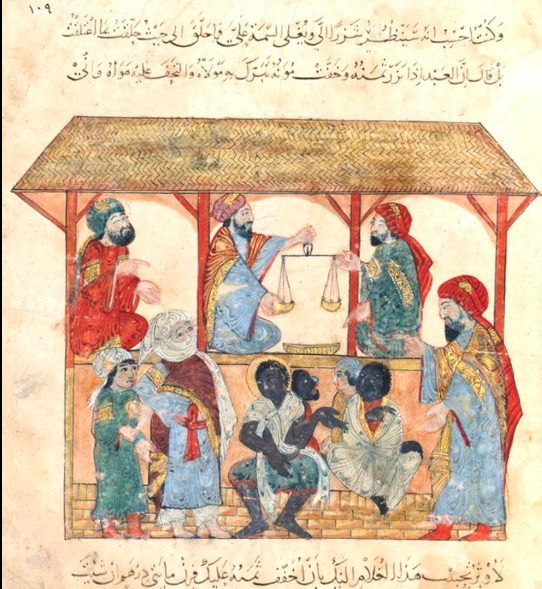Slavery – How it survived and flourished after the 7th century


The history of slavery in the world goes back to the Mesopotamian era, as the world became more accustomed to the concept of social stratification. In many societies, the status of a family was measured on the basis of the number of slaves owned by it. Slavery was widespread in medieval times and was found in all ancient civilisations originating from the west, including the Roman Empire, and was overtaken by Christian and Islamic warfare during the middle ages. In pre-Islam Arabia, slavery existed in some form, and it was further developed and expanded in all forms later on. All non-Muslims who could be over-powered in any form by the followers of Islam would automatically become their slaves. The reason for this development in the industry is, that Islam is a unique faith where the scriptures encourage and protect the trade of humans. Not only this, the scripture also elaborates on how these slaves can be put to use, when a man is not to look at other women after he has his fill of 4 wives, but there is no restriction on the number of slaves he can cohabit with, and these are called the ones which ‘the right hand possesses’.
(33:52) Thereafter women will not be lawful for you, and it will not be lawful for you to take other wives in place of them, even though their beauty might please you, unless they be those whom your right hand owns.
This verse explains why one is permitted to have conjugal relations with one’s slave-girls besides the wedded wives, and there is no restriction on their number.
All of this is endorsed by Sharia, as permits raiding, kidnapping and enslaving Kuffar from Dar ul Harb. Scholars who have written extensively on the matter, ruled that Jihad was not needed to seize non-Muslims nor was it necessary to invite them to Islam before seizing them. Raiders were free to take and enslave any Kuffar. This predicament was another sword to be held over the heads of non-Muslims in any Muslim conquered area, as Islamic jurists held that non-Muslims who lived in areas, which had formal pacts with Muslims, were to be protected from enslavement. However, any of them failing to pay jizya would be considered as breaking their contract with the captors, and cold as slaves in markets. Moreover, there are various mentions of War Booty in various scripture and books written on early Islamic conquests. According to the Muslim tradition, the early Muslim community was involved in near-constant conflicts with neighboring Arab tribes, local Jews, and the pagans of Mecca. The very first independently dated document in which mention of the Prophet, is the Greek Διδασκαλία Ἰακώβου Didaskalia Iacobou (The Teaching of Jacob). This mentions the arrival of the prophet and accomplices arriving in Palestine “armed with a sword.” Such warfare in this historical period was always accompanied by looting and plunder on the part of the winning army, and the subject of taking war booty and who has primary claim on it, comes up again and again in the early Islamic sources, as this was clearly an important, even driving factor for the early Muslim movement. The requirement for more men and women to carry out various menial tasks as well as satisfying the lust of the warriors encouraged them to capture more slaves. Further, allowance for ‘Booty’ is provided in the scripture, and described as spoils of war in at least 4 places. 8:1 Quran says
They ask thee (O Muhammad) of the spoils of war. Say: The spoils of war belong to Allah and the messenger, so keep your duty to Allah, and adjust the matter of your difference, and obey Allah and His messenger, if ye are (true) believers.
As per the tradition, the entire population of a conquered territory could be enslaved, thus providing women who were otherwise rare on the battlefield. This paved the path for concubinage, which today is proudly called “the oldest profession” in Bharat too. Many do not want to accept or acknowledge the roots of this profession, which lie in ancient Mughal traditions of slavery.
As per historic tradition, Muslim kingdoms continued with the tradition of how to enslave, and what protocol to follow. The Muslim military commander was allowed to choose between unconditionally releasing, ransoming or enslaving war captives. Historically, the consent of a slave girl for sex, for withdrawal before ejaculation or to marry her off to someone else was not considered necessary. Maria the Copt, a Christian slave of the Prophet, gave birth to his only male child Qasim. Maria was a gift from the Governor of Alexendria (ancient Egypt). In fact, there are mentions in Hadith books on how Aeysha and Hafsa, both wives of the Prophet, would squabble with him about not spending enough time with them. Aysehsa once gave him the chase and was pushed with strength as a punishment. Conversationally, the Quran talks about the misgivings the older wives too, and provides space for Londis inside the married life of the Prophet. According to Sunan An Nisa 4:36:3411,
It was narrated from Anas, that the Messenger of Allah had a female slave with whom he had intercourse, but ‘Aishah and Hafsah would not leave him alone until he said that she was forbidden for him. Then Allah, the Mighty and Sublime, revealed:”O Prophet! Why do you forbid (for yourself) that which Allah has allowed to you.’ until the end of the Verse.
The topic will continue in the next article.
DISCLAIMER: The author is solely responsible for the views expressed in this article. The author carries the responsibility for citing and/or licensing of images utilized within the text.
